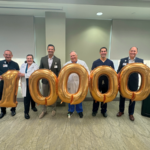
Sandy and Ellan Smith with Dr. Pete Schultz
February 7 2020 – Peter Schultz, PhD, a pioneering chemist and president and CEO of Scripps Research, kicked off the institute’s new Front Row Lecture Series on its Florida campus on Wednesday, Jan. 22, with a presentation on how the institute is reinventing itself to move scientific discoveries to patients with unmet medical needs more efficiently.
The Front Row Series of lectures, which is free to attend with a reservation, invites audience members to “take a front row seat to history” and learn about the scientific and medical advances arising from Scripps Research—advances that are changing science and human health in areas including cancer, multiple sclerosis, heart disease, ALS, muscular dystrophy, Parkinson’s, addiction, aging and more. The second of four lectures, scheduled for Feb. 19, focuses on how a selective ‘memory erasure’ medicine may one day aid in addiction recovery or ameliorate PTSD symptoms. To reserve a seat, register at www.scripps.edu/frontrowfl, email frontrowfl@scripps.edu or call 561-228-2016.
Scripps Research is an independent, nonprofit biomedical institute ranked the most influential in the world for its impact on innovation. With campuses in La Jolla, California, and Jupiter, Florida, we are advancing human health through profound discoveries that address pressing medical concerns around the globe. Our drug discovery and development division, Calibr, works hand-in-hand with scientists across disciplines to bring new medicines to patients as quickly and efficiently as possible, while teams at Scripps Research Translational Institute harness genomics, digital medicine and cutting-edge informatics to understand individual health and render more effective healthcare. Scripps Research also trains the next generation of leading scientists at our Skaggs Graduate School, consistently named among the top 10 U.S. programs for chemistry and biological sciences. Learn more at www.scripps.edu.
At the first lecture in the series, Schultz, a pioneer in the fields of chemical and synthetic biology, spoke about “Accelerating Translation of Discoveries into Medicine.” He described how foundation and donor support have enabled Scripps Research to build a unique drug discovery program within the non-profit institute. Called the ReFRAME library, it involved painstakingly building a collection of about 12,000 drug-like compounds which have already passed initial safety testing in humans. This means, by using robotics and state-of-the-art screening technologies, scientists can test the library’s contents against other important disease targets, including infectious diseases like the novel coronavirus and gastrointestinal germs; neurodegenerative diseases such as Parkinson’s and Alzheimer’s; multiple types of hard-to-treat cancer; and rare genetic diseases.
“If our scientists are able to find a ‘hit’ within this library of drugs, it means it may be possible to rapidly deploy such drugs into clinical trials and, importantly, cut the cost of finding cures for many of these diseases,” said Schultz. “This resource has already identified that an existing drug against leprosy is extremely effective against cryptosporidium, a cause of childhood diarrhea and death globally.”
Schultz founded the California Institute for Biomedical Research (Calibr) in 2012, with the goal of accelerating the discovery of new medicines for unmet needs. Now a division of Scripps Research, Calibr oversees a pipeline of innovative new therapies, some already in clinical trials.
The second Florida Front Row Lecture will be held at the institute’s Jupiter campus on Wednesday, Feb. 19 at 4 pm. Neuroscientist Courtney Miller, PhD, will discuss “The Surprising Science of Memory Erasure.” Miller and her laboratory team are finding ways to selectively interfere with memories that can trigger drug addiction relapse or drive PTSD symptoms. Her trailblazing research has earned funding from the National Institutes of Health.
Innovative chemist Matthew Disney, PhD, is making drugs for diseases long considered “undruggable.” Rather than targeting proteins, as most drugs do, Disney has developed a successful way to target RNAs, the cellular machinery that helps build proteins. He will present his Front Row Lecture on Wednesday, March 18, titled “Advancing Precision Medicines to Stop Cancer, ALS, Muscular Dystrophy and More. “
To close the inaugural Front Row Lecture series, Michael Farzan, PhD, co-chair of the Department of Immunology and Microbiology at Scripps Research, will share his research into the body’s response to viral infections and the efforts of his team to develop a new type of vaccine. His talk, “Next-Generation Vaccines to Stop HIV, Influenza, Zika and Beyond,” will be presented on Wednesday, April 22.
To learn more about Scripps Research and the Front Row Lecture Series, visit www.scripps.edu/frontrowfl.



























